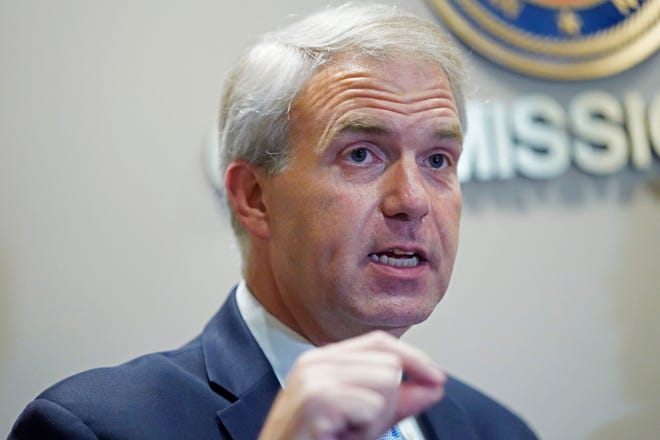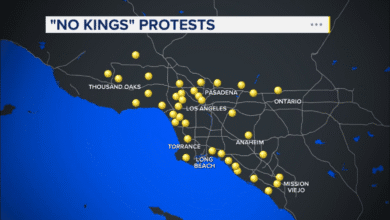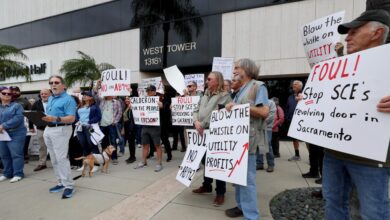Will Brandon Presley join small list of Deep South Democrats who win?

A fundraiser for Democrat gubernatorial hopeful Brandon Presley will be held Thursday in Mississippi’s only neighboring state with a Democratic governor — Louisiana.
Expected to attend the New Orleans event, according to invitations obtained by the Clarion Ledger, is Louisiana Gov. John Bel Edwards, a man Presley wants to soon join on a relatively short list of recent Democrats to win in the Deep South.
A spokesperson for the Presley campaign declined to comment on fundraising events and would not say whether Presley will attend in person. According to the invitation, admission to the St. Charles Avenue event will set attendees back anywhere from $250 to $5,000. Listed alongside Edwards as hosts are attorney Gladstone Jones and his wife Amanda and famed Louisiana-based political strategist James Carville.
Among Southern states, only three currently have Democratic governors. Two of those have statewide elections this year. In Louisiana, where Edwards is term limited, two Democrats and a number of Republicans are lining up hoping to take the job back. In Kentucky, Gov. Andy Beshear is seeking a second term, with at least a dozen Republicans facing off in their primary. In North Carolina, where elections are not until next year, Gov. Roy Cooper is in the midst of his second term.
And then there’s Mississippi, which has not had a Democrat in the governor’s mansion since Ronnie Musgrove was defeated by Haley Barbour in the 2003 statewide elections. Presley, a lifelong Democrat and second cousin of Elvis, who has represented a relatively conservative area on the Public Service Commission since 2008, hopes to change that.
Michael Beyer, communications director for Presley’s campaign, said while there are lessons to be learned from other states, Presley is his own unique candidate.
“Brandon Presley is running as his own man — and that man is northeast Mississippi hill country through and through,” Beyer said. “Brandon is proud of his rural roots, he’s known to sing to a little bluegrass music from time to time, grew up with a single mother, and has never forgotten where he comes from, which is why he’s fighting to clean up corruption, provide healthcare to 220,000 working Mississippians and keep our hospitals open, improve our public schools, and make sure state government works for the people, not famous celebrities and well-connected lobbyists.”
That said, Presley is notably surrounding himself with veterans from the successful campaigns of Edwards, Beshear and Cooper. Beyer previously worked at the Ohio Democratic Party, but before that he was a staffer at the Democratic Governors Association, where he worked with Edward’s 2019 reelection campaign and Beshear’s first run, both of which brought Democratic leadership to traditionally Republican states.
In January, Presley hired Cooper’s former campaign manager, Trey Nix, as a consultant.
And then there’s Carville, who rose to national prominence as lead strategist for the 1992 Clinton presidential campaign. The so-called “Ragin’ Cajun” also helped raise money for Edwards and Beshear.
In addition to local staff, including his own sister, Presley has brought in more nationally and regionally experienced staffers than any Mississippi Democrat in recent history. There are also high-level staffers who came from unsuccessful campaigns in the South, like his digital director Jake Laves, who worked on Stacey Abrams’ gubernatorial campaign in Georgia. The campaign manager, Ron Owens, was political director for a successful Democratic run outside of the South, helping Michigan Gov. Gretchen Whitmer secure reelection last year.
Former Mississippi Attorney General Jim Hood, who came about 45,000 votes short of defeating Republican Tate Reeves in the previous gubernatorial race, ran a campaign primarily with trusted staff from his past runs for office. That margin, about 5% of voters, was far closer than the roughly 17% that Republican Donald Trump won the state by in both 2016 and 2020.
Hood faced one potential barrier that Presley will not. In 2020, Mississippi voters approved a constitutional amendment removing requirements that statewide candidates must win not just a majority of votes, but also a majority of districts of the state House of Representatives. If no candidate were to meet those requirements, the winner would be picked by the House. Those requirements were added during the post-Reconstruction Era as a number of Jim Crow voting policies made their way into the new 1890 state constitution.
If Hood were to have gained those additional 45,000 votes, he still likely would not have won over a majority of House districts, leaving the choice between him and Reeves to the Republican super-majority chamber.
Presley campaign staff and those within the state Democratic Party say they hope the removal of this barrier will give likely Presley voters more confidence that their decisions to show up on election day can’t be thwarted by the GOP-controlled legislature.




